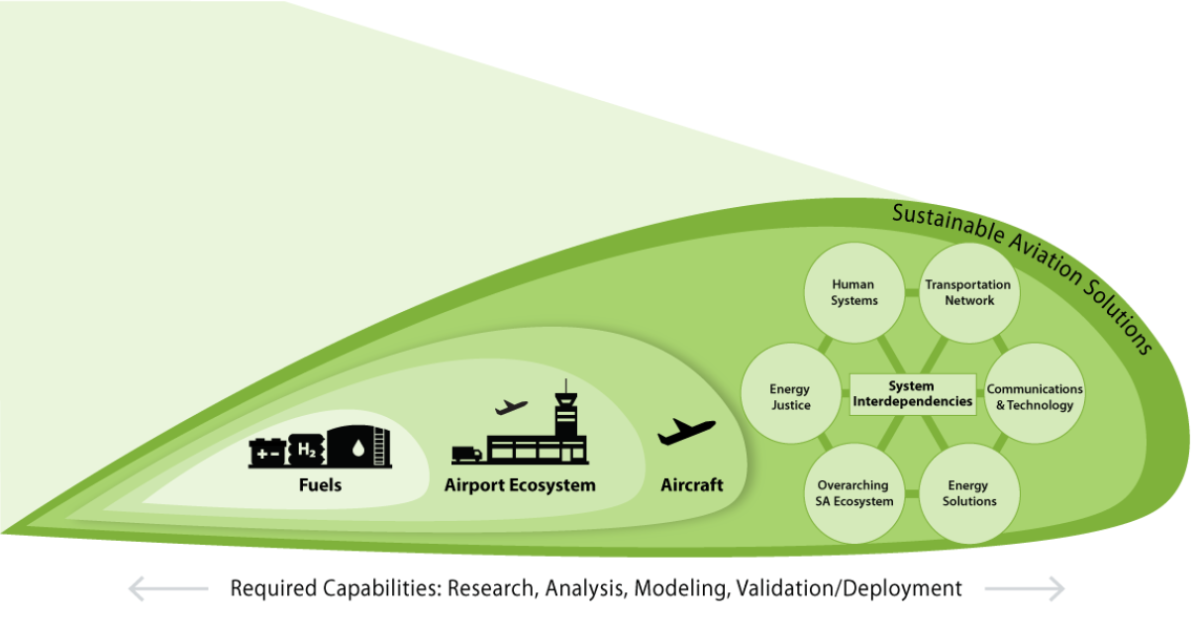Around the world, entities of all sizes seek to modernize the aviation industry by optimizing routes, increasing aircraft efficiency, and reducing fossil fuel dependence. The industry is balancing strong passenger and cargo demand, safety, and the need for decarbonization. Globally, aviation accounts for about 1 gigaton of greenhouse gas emissions per year (approximately 2% of global emissions in 2019) and is poised to increase.
The industry is committed to achieving decarbonization by continuing energy-efficiency efforts and introducing sustainable fuels and new types of aircraft. Currently, the focus is on fuels for flight operations and, to a lesser extent, low- to zero-emission ground operations. Most recently, multiple alternative-propulsion systems and fuels have been proposed, including electrified and hydrogen-fueled aircraft.
Transforming the Aviation Ecosystem
Decarbonizing the aviation industry will require steady, transformational growth. Efforts are already underway and growing, with commitments from industry coalitions such as the US Federal Aviation Administration, International Civil Aviation Organization (ICAO), International Air Transport Association, and others to reduce CO2, other emissions, and environmental impacts.
For example, ICAO’s global coalition for sustainable aviation includes companies like Airbus and Archer that are pursuing zero-emission aircraft and universities like Cranfield University, UK, and the Eindhoven University of Technology, the Netherlands, that are researching novel fuels. The coalition includes 47 partners dedicated to sustainable aviation.
Major efforts are focused on sustainable aviation fuel, and leading airports are evaluating ways to both modernize and decarbonize, targeting net-zero operations by 2050 or sooner. To meet these goals and create financially viable low-carbon solutions at unprecedented speed and scale, public and private stakeholders have expressed the need to collaborate. They recognize that new approaches will be needed to bring these solutions to fruition, including a coordinated research, development, demonstration, and deployment focus.
Figure 1 shows the three major pillars of the aviation ecosystem: energy carriers (fuels), airport ecosystems, and aircraft. Categorizing the numerous interconnections, subsystems, and energy-related influences is key to ensuring prioritization of the largest, most influential decarbonization pathways while minimizing unintended consequences to adjacent activities and communities.

This is an excerpt of a larger technical report from the National Renewable Energy Laboratory (NREL). Access the full report or visit the NREL website to explore ongoing sustainable aviation research.
This work was authored by NREL, operated by the Alliance for Sustainable Energy, LLC, for the US Department of Energy (DOE) under Contract No. DE-AC36-08GO28308. The views expressed in the article do not necessarily represent the views of the DOE or the US government. The publisher, by accepting the article for publication, acknowledges that the US government retains a nonexclusive, paid-up, irrevocable, worldwide license to publish or reproduce the published form of this work, or allow others to do so, for US government purposes.
©2023 Alliance for Sustainable Energy, LLC. All rights reserved.
[For more from the authors on this topic, see: “A Roadmap Toward a Sustainable Aviation Ecosystem.”]













